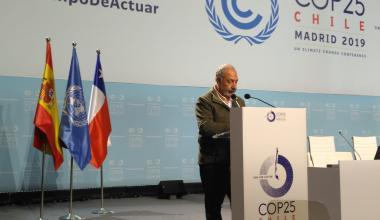Update from COP26
Three months ago, at a time when fires, floods and heatwaves raged across the continents, all governments unanimously endorsed the dramatic warnings issued by the Intergovernmental Panel on Climate Change (IPCC) regarding the scale of the impacts that our planet will face if we do not change course. The IPCC stressed that governments could still protect the rights of present and future generations to a safe climate, but only if they undertook urgent and systemic action.
The researchers conclude, our carbon budget will be gone by the end of this decade. Staying below 1.5°C global warming will require a rapid and massive cut in our carbon emissions.
Despite this stark warning, most governments have failed to review their national climate commitments and energy policies in line with science. We are still waiting for governments gathered in Glasgow to adopt action-oriented decisions that bolster mitigation measures and effectively ratchet up ambition. This means, among other outcomes, reaffirming the need to keep temperature increase below 1.5°C, agreeing that national governments must submit enhanced commitments every five years, and establishing an annual ambition enhancement mechanism to mobilize greater action until the mitigation ambition gap is closed.
Failing to do so would let COP26 go down in history as a fatal blow to the Paris Agreement where governments have abdicated their responsibility to deliver on the Paris goals. This is particularly difficult with an unprecedented push for false solutions that divert global attention from the urgent need to phase out fossil fuels.
During the COP26, and since 2017, agriculture issues have been discussed in the Koronivia Joint Work on Agriculture (KJWA), under the United Nations Framework Convention on Climate Change (UNFCCC). KJWA covers a range of interrelated topics such as soil, livestock, nutrient and water management, food security, the socioeconomic impacts of climate change across agriculture and methods for assessing climate change.
Our position regarding issues addressed at KJWA can be summarized as the following:
- The complexity of local adaptation needs, coupled with the need to address the resilience of food systems as a whole, calls for a holistic and systemic approach in line with the four principles of organic agriculture, to address agriculture in the climate context, and must not be limited to narrow technological fixes or on counting carbon.
- Agroecological approaches were specifically recommended by the IPCC SRCL as they avoid emissions from industrial agriculture, and improve resilience to erratic weather conditions. These approaches also address environmental problems such as accelerated biodiversity loss, pollution, soil destruction and water scarcity. Synthetic nitrogen fertilisers were spotlighted during the KJWA workshop as a major component of agriculture’s harmful contribution to the climate. Not only are these unnecessary – as agroecological methods for soil fertility are easily accessible – but they receive billions in public subsidies. In some countries, these account for more than half of the national agriculture budget. The KJWA must take this learning forward and recommend policies and measures that lead to shifts towards agroecological methods and production, including through shifting subsidies away from synthetic nitrogen fertilisers, and towards supporting agroecology and support for smallholder farmers.
- Production and consumption of livestock – particularly industrialised, factory farmed methods, for which feed production has an outsized impact on deforestation and agricultural emissions – must change towards a “less and better” approach, and ways to increase vegetable proteins in diets must be incentivized.
- The lack of climate finance, particularly for adaptation, is also holding back the necessary shifts in agriculture. KJWA outcomes can play a role in recommending increased finance flows, and better application of the use of finance to strengthen climate action in agriculture.
The KJWA negotiations concluded on 5 November in an agreement on the need for a transition towards sustainable and climate-resilient food systems, taking into consideration the vulnerability of agriculture to the impacts of climate change. To achieve this transition, participants acknowledged the key role of:
- soil and nutrient management practices, for instance, organic fertilizer and enhanced manure management
- sustainably managed livestock systems, such as enhancing animal health and sinks on pasture and grazing lands
Furthermore, they also noted the importance of scaling up support and resources to achieve inclusive, sustainable and climate-resilient agricultural systems.
We continue to influence the text for the KJWA outcome decision to be adopted at COP27 in November 2022, so that it requires more concrete actions from countries to include measures on sustainable agriculture in the climate action plans.
On the sidelines of the COP
New research undertaken by Greenpeace, IATP and GRAIN shows that synthetic nitrogen fertilisers are a major driver of the climate crisis, responsible for 1 out of every 40 tonnes of greenhouse gases currently pumped into the atmosphere. The research provides the first estimate of the global climate impacts of synthetic nitrogen fertilisers to cover the entire production chain, from manufacturing to soil application. It finds that synthetic nitrogen fertilisers generated 1,250 million tonnes of CO2e in 2018, accounting for nearly a quarter of all direct emissions from agriculture and 1.5 times the emissions from commercial aviation. This underscores the urgent need for a global phase-out of synthetic nitrogen fertilisers and a massive shift to sustainable farming methods such as organic agriculture.
Soil conservation and improvement are fundamental to the sequestration of carbon through photosynthesis via agriculture and forestry. It is also in line with the UN Sustainable Development Goals (SDGs) of improving food security, helping agriculture and forestry adapt to climate change and contributing to climate change mitigation. Since its launch in Paris, IFOAM - Organics International has been a Consortium Member in the "4 per 1000: Soils for Food Security and Climate" initiative.
Six years after its inception and following the adoption of its Strategic Plan in 2020, the Initiative presented its Implementation Strategy at COP26, outlining activities to achieve its 2050 goals. The Strategy holds opportunities to support a global shift towards organic agriculture which can conserve and improve soils.
Climate activists were campaigning against the EU’s new Common Agricultural Policy all the way to the top COP26 climate conference in Glasgow, ahead of a key vote in Strasbourg this month.
On Friday, 5 November, members of the Fridays for Future youth movement marched through Glasgow with a banner calling on MEPs to reject the proposed CAP reform as it is not focusing on small-scale farms and not pushing for organic farming enough. The European Parliament is expected to vote on the post-2023 farm subsidies scheme in about two weeks. Thousands of more activists gathered on Saturday in a demonstration focused on issues of nature and land use.
To mark Nature and Land Use Day, 150 organisations have agreed over the weekend to accelerate the deployment of green innovations for the agriculture sector, while 45 nations have agreed to reform policies to support a sustainable food system.
According to the initiators, the new policy action agenda is designed to help policymakers make the necessary changes to deliver a food system that is not only low-carbon and deforestation-free, but that supports farmers and others across the food chain; consumes less water and chemicals and produces less waste.
The Global Action Agenda on Innovation in Agriculture was signed by the same 45 nations, plus more than 100 other organisations including businesses, research institutions, farmers groups and regions and states. The Agenda will aim to leverage more than $4bn of public investment in innovations such as climate-resilient crops, digital technologies and solutions that improve soil quality.
IFOAM - Organics International welcomes such ambitions, particularly when they come with an inclusive monitoring mechanism on the true value of the funds spent and on the impact of such policy change.
We are following COP26 as it continues until the weekend in the hope to see increased action from countries to integrate climate action with a shift towards sustainable food systems. Stay tuned for more information.


